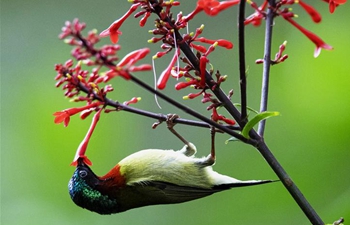SYDNEY, Nov. 21 (Xinhua) -- Female Tasmanian devils cope better with a major cancer than their male counterparts, pointing to better understanding of treatment and wildlife evolutionary processes, Australian research showed Wednesday.
Researchers from the University of Tasmania monitored the effects of the cancer, known as Devil Facial Tumor Disease, on two wild populations of Tasmanian devils, which are the world's largest marsupial carnivores, in the northwest of the Australian island state over three years.
The team found that as the disease progressed with tumor sizes growing, it was the female response to the debilitating condition that came as a surprise, the study's lead author Manuel Ruiz said in a statement.
"The most surprising and interesting result is that females lose much less body condition than males as the disease progresses," he said.
"While males can lose up to 25 percent of their body weight because of the cancer, in females this impact is approximately 5 to 10 percent."
The findings highlighted the evolution of tumors and suggested that female devils may have some ways to cope with the disease better than males, said Ruiz.
The co-author of the latest report, Dr. Rodrigo Hamede, said several studies have demonstrated that the animals are adapting to the cancer epidemic in the last five years.
"This is another layer of evidence showing that devils are learning to live with the cancer" and that coexistence between devils and the disease is a "possible outcome," said Hamede.
More research into the differences in tolerance to the disease between males and females and their impact on wildlife needed to be done, said Ruiz.
The findings were published in the Proceedings of The Royal Society B: Biological Sciences academic journal.
"This will help to create a better understanding of how devils and tumors may be evolving in natural conditions, and how these findings may complement the current efforts to preserve the species," he said.













